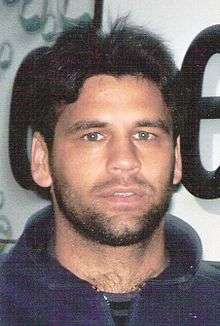Ulf Kirsten
 | |||
| Personal information | |||
|---|---|---|---|
| Full name | Ulf Kirsten | ||
| Date of birth | 4 December 1965 | ||
| Place of birth | Riesa, East Germany | ||
| Height | 1.72 m (5 ft 7 1⁄2 in) | ||
| Playing position | Striker | ||
| Youth career | |||
| 1972–1978 | BSG Chemie Riesa | ||
| 1978–1979 | BSG Stahl Riesa | ||
| 1979–1983 | Dynamo Dresden | ||
| Senior career* | |||
| Years | Team | Apps | (Gls) |
| 1983–1990 | Dynamo Dresden | 154 | (57) |
| 1990–2003 | Bayer Leverkusen | 350 | (182) |
| 1983–2003 | Total | 504 | (239) |
| National team | |||
| East Germany U21 | 10 | (4) | |
| 1985–1990 | East Germany | 49 | (14[1]) |
| 1992–2000 | Germany | 51 | (20[1]) |
| Teams managed | |||
| 2003–2005 | Bayer 04 Leverkusen (assistant) | ||
| 2005–2011 | Bayer 04 Leverkusen II | ||
|
* Senior club appearances and goals counted for the domestic league only. | |||
Ulf Kirsten (born 4 December 1965 in Riesa, East Germany) is a former German football striker,[2] the first player in history to reach a total 100 caps playing with two different national teams. His biggest success was the win of the 1992–93 DFB-Pokal. His nickname was der Schwatte (dialect for "der Schwarze", the black one).
Club career
Dynamo Dresden
On club level, Kirsten played for only two teams: from 1983 to 1990 he was with Dynamo Dresden. In the East German Oberliga he made 154 matches and scored 57 goals for Dresden.
Kirsten had an unusual build, measuring only 172 cm (5'8"), but weighing 81 kg (179 lbs). He had an unusually low centre of gravity which enabled him to protect the ball in the box against much bigger defenders and turn around quickly for close-range shots. This playing style was often compared to that of Gerd Müller. In addition, despite his small height, Kirsten was also a feared header.
Bayer Leverkusen
He was one of the first East German footballers to enter the Bundesliga after the German reunification. In the German Bundesliga he played 350 matches for Bayer Leverkusen and scored 182 goals (ranked # 5 in the All-Time-Scorer-List). Kirsten established himself as one of the most dangerous strikers in the Bundesliga, but Bayer regularly ended as runner-up to either Bayern Munich or Borussia Dortmund. He stayed there until his retirement in 2003. He also played in the 2002 UEFA Champions League Final. In the 1999–2000 season, Kirsten won the EFFIFU award for being the most efficient striker in the league.
Off the pitch, Kirsten was famous for his strong beard growth, which earned him a sponsorship by Braun, who used him to advertise their electrical shavers.
International career
Kirsten's 100 caps are almost evenly split: 49 for East Germany and 51 for the re-unified Germany in a career which spanned 15 years from 1985 until 2000, with the reunified team being formed in late 1990.[1]
He scored a total of 34 international goals, 14 of them for East Germany. His only major tournaments came late in his career; Kirsten played for his country at the 1994 and 1998 World Cups and Euro 2000.
Managerial record
- As of 25 May 2012
| Team | From | To | Record | |||||||
|---|---|---|---|---|---|---|---|---|---|---|
| G | W | D | L | GF | GA | GD | Win % | |||
| Bayer Leverkusen II | 1 July 2005 | 30 June 2011 | 209 | 72 | 50 | 87 | 292 | 313 | −21 | 34.45 |
| Total | 209 | 72 | 50 | 87 | 292 | 313 | −21 | 34.45 | ||
Personal
His son Benjamin is a goalkeeper and used to play for Dynamo Dresden and NEC.[3]
Honours
- DDR-Oberliga (2): 1988–89, 1989–90
- FDGB-Pokal (2): 1984–85, 1989–90
- Individual
References
- 1 2 3 "Ulf Kirsten - International Appearances". RSSSF. Retrieved 14 June 2016.
- ↑ "Kirsten, Ulf" (in German). kicker.de. Retrieved 4 March 2012.
- ↑ "Kirsten vor 3. Liga-Debüt" (in German). kicker.de. 29 April 2009. Retrieved 4 March 2012.
External links
- Entry in the who's who of Leverkusen (German)
- Ulf Kirsten profile at Fussballdaten